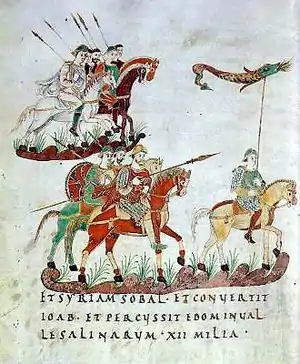773
Year 773 (DCCLXXIII) was a common year starting on Friday (link will display the full calendar) of the Julian calendar. The denomination 773 for this year has been used since the early medieval period, when the Anno Domini calendar era became the prevalent method in Europe for naming years.
| Millennium: | 1st millennium |
|---|---|
| Centuries: | |
| Decades: | |
| Years: |
| 773 by topic |
|---|
| Leaders |
|
| Categories |
|
| Gregorian calendar | 773 DCCLXXIII |
| Ab urbe condita | 1526 |
| Armenian calendar | 222 ԹՎ ՄԻԲ |
| Assyrian calendar | 5523 |
| Balinese saka calendar | 694–695 |
| Bengali calendar | 180 |
| Berber calendar | 1723 |
| Buddhist calendar | 1317 |
| Burmese calendar | 135 |
| Byzantine calendar | 6281–6282 |
| Chinese calendar | 壬子年 (Water Rat) 3469 or 3409 — to — 癸丑年 (Water Ox) 3470 or 3410 |
| Coptic calendar | 489–490 |
| Discordian calendar | 1939 |
| Ethiopian calendar | 765–766 |
| Hebrew calendar | 4533–4534 |
| Hindu calendars | |
| - Vikram Samvat | 829–830 |
| - Shaka Samvat | 694–695 |
| - Kali Yuga | 3873–3874 |
| Holocene calendar | 10773 |
| Iranian calendar | 151–152 |
| Islamic calendar | 156–157 |
| Japanese calendar | Hōki 4 (宝亀4年) |
| Javanese calendar | 667–669 |
| Julian calendar | 773 DCCLXXIII |
| Korean calendar | 3106 |
| Minguo calendar | 1139 before ROC 民前1139年 |
| Nanakshahi calendar | −695 |
| Seleucid era | 1084/1085 AG |
| Thai solar calendar | 1315–1316 |
| Tibetan calendar | 阳水鼠年 (male Water-Rat) 899 or 518 or −254 — to — 阴水牛年 (female Water-Ox) 900 or 519 or −253 |

Frankish cavalry (with mail armour)
Events
Europe
- Summer – King Charlemagne and his uncle Bernard, son of Charles Martel, cross the Alps with a Frankish expeditionary force at the request of Pope Adrian I. At the foot of the mountains in the Susa Valley (Northern Italy), the Franks are hindered by Lombard fortifications. After scouting, Charlemagne attacks the defenders from the flank, and forces the Lombards to flee to the fortified capital Pavia.
- Siege of Pavia: Charlemagne besieges Pavia, which is poorly stocked with food. King Desiderius remains in the capital, and orders his son Adalgis to defend Verona to guard Gerberga, and the children of Carloman I. After a short siege, Adalgis flees to Constantinople, where he is received by Emperor Constantine V. Meanwhile, the Franks capture the cities of Verona and Mortara.
- Saxon Wars: Saxon forces seize upon Charlemagne's preoccupation with Italy to retake Eresburg and Syburg (near Dortmund). They unsuccessfully attack the episcopal centre of Büraburg, which had been established by St. Boniface (see 723).[1]
Britain
- King Alhred of Northumbria makes overtures of friendship toward Charlemagne (approximate date).
Abbasid Caliphate
- The number 0 is introduced to the city of Baghdad, which will be developed in the Middle East by Arabian mathematicians, who will base their numbers on the Indian system (long after the Maya culture developed the concept, cf. Maya numerals).[2]
Asia
Ecology
- A large and sudden increase in radiocarbon (14C) occurs around 773, in coral skeletons from the South China Sea[4] (see 774-775 carbon-14 spike).
Births
- Duan Wenchang, chancellor of the Tang Dynasty (d. 835)
- Fujiwara no Otsugu, Japanese statesman (d. 843)
- Heizei, emperor of Japan (d. 824)
- Li Su, general of the Tang Dynasty (d. 821)
- Liu Zongyuan, Chinese poet and official (d. 819)
- Pepin of Italy, son of Charlemagne (d. 810)
- Peter of Atroa, Byzantine abbot and saint (d. 837)
- Wei Chuhou, chancellor of the Tang Dynasty (d. 829)
Deaths
References
- David Nicolle (2014). The Conquest of Saxony AD 782–785, p. 14. ISBN 978-1-78200-825-5
- "The History Of Zero". Yale Global. April 25, 2009. Archived from the original on August 25, 2016.
- "Indian Institute of Technology Guwahati". Archived from the original on April 11, 2005. Retrieved September 11, 2006.
- Liu, Y; Zhang, ZF; Peng, ZC; Ling, MX; Shen, CC; Liu, WG; Sun, XC; Shen, CD; Liu, KX; Sun, W (2014). "Mysterious abrupt carbon-14 increase in coral contributed by a comet". Sci Rep. 4: 3728. Bibcode:2014NatSR...4E3728L. doi:10.1038/srep03728. PMC 3893640. PMID 24430984.
- The Chronology of the Irish Annals, Daniel P. McCarthy
This article is issued from Wikipedia. The text is licensed under Creative Commons - Attribution - Sharealike. Additional terms may apply for the media files.